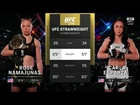Ask the Fight Doc: When's the right time for refs to stop fights due to strikes?
- from http://www.mmajunkie.com/ on Jul 29, 2013
- 79 views
- Comment
When exactly is the right time for a referee to halt an MMA bout due to strikes?
As MMAjunkie.com medical columnist and consultant, Dr. Johnny Benjamin explains, it can be tough for officials to determine.
However, there are signs they can look for to determine when a fighter is concussed and susceptible to serious health issues. However, in the current landscape of professional fighting, many of those signs are often ignored.
* * * *
Doc, I follow you on Twitter, and you frequently comment on fight stoppages. When do you think is the right time for a referee to call a fight due to strikes? – Anonymous
Stopping a fight is a very difficult but vitally important responsibility for many reasons. Always remember that the referee’s primary responsibility isn’t to make sure the fans have plenty to cheer about; above all else, the referee – at all times – must promote the safety of the fighters.
Being an MMA referee is a very important and amazingly difficult responsibility. Any decision the refs make will immediately be met with infinite scrutiny from the all-knowing public. The refs’ judgment and decisions can alter the health and career of a fighter, popularity of a promoter’s fight card, and money from the wagering public. Not to mention that the abuse by the disgruntled fans in attendance and online will be immediate and vicious.
My hat’s off to them for taking the job.
I will attempt to address this issue from purely a fighter-safety perspective, though I know that many fans may be simultaneously considering many other issues. I also know that my opinion will not be popular with many, but that’s never stopped me before.
First, I must create a basis for my argument.
Research is suggesting that the time immediately after a concussion is very important in the health of the injured brain. During this time, the highly susceptible brain must be protected from further potential for trauma (blunt force via strikes and lack of blood flow or oxygen via submissions). The current medical position is that any athlete, especially a contact athlete who has a reasonable degree of suspicion of concussion, must be barred from further competition.
The definition of a concussion is the traumatic disruption of normal brain function. Loss of consciousness (KO) is not required for a concussion to occur, but by definition, all losses of consciousness (KO) are concussions. (And just to be clear, “flash” knockouts are indeed concussions and should be treated as such.)
Still with me?
If the referee has a reasonable degree of suspicion that a concussion has occurred, the health of the fighter needs to be protected, and the fight must be stopped. The referee isn’t asked to make a definitive medical diagnosis – but to be vigilant of the signs of a probable concussion and quickly act accordingly. In real time, what do fighters look like who should provoke a reasonable suspicion of concussion after head strikes?
- Loss of balance and coordination (aka doing the “chicken dance” looking for a place to fall)
- Amnesia (between rounds asking where they are or what happened, so the ref should be in the corner listening)
- Dazed, confused, “bell rung,” “dinged” or “on queer street”
- Falling “like a ton of bricks” after a head strike with no real attempt to break the fall (especially face planting or having any portion of head striking the mat first)
- Difficulty finding their proper corner (and not immediately recognizing their corner people)
- Vomiting in the corner between rounds
- Difficulty or hesitancy following simple instructions
- Staggering and stumbling back to corner
We’ve all seen fights in which a fighter who was allowed to “fight on” after a highly suspicious blow to the head still miraculously comes back to win the fight (think Pat Barry vs. Cheick Kongo). Spectacular, no doubt. But no one has ever said that a concussed fighter cannot come back to win a fight.
Another common misconception is the notion of “recovery time.” Many fans seem to believe if a fighter recovers quickly, the fight shouldn’t be stopped. But I must ask: recovered from what? The concussion that he or she likely sustained? Recovery from a head blow is not part of the proper decision-making process when it comes to fighter safety and potential concussions. The mere fact that a fighter needs to recover from head blows should provoke a stoppage.
I know that my medical opinion will be highly unpopular with many, but being a doctor who promotes patient and athlete safety often ruffles feathers. Reasonable patient/athlete safety is nonnegotiable.
Dr. Johnny Benjamin is MMAjunkie.com’s medical columnist and consultant and a noted combat-sports specialist. He is also a member of the Association of Boxing Commissions’ MMA Medical Subcommittee. Dr. Benjamin writes an “Ask the Doc” column approximately every two weeks for MMAjunkie.com. To submit a question for a future column, email him at askthedoc [AT] mmajunkie.com, or share your questions and thoughts in the comments section below. You can find Dr. Benjamin online at www.drjohnnybenjamin.com, and you can read his other sports-related articles at blog.drjohnnybenjamin.com.
view original article >>Comments
Search for:
- UFC News
- TUF News
- Bellator News
- WSOF News
- Invicta FC News
- ONE FC News
- Boxing News
- Kickboxing News
- Glory News
- EBI News





























